
OR
Survivors of domestic violence are forced to “compromise” with abusive husbands
Published On: May 16, 2020 02:50 PM NPT By: Sher Bahadur Jero
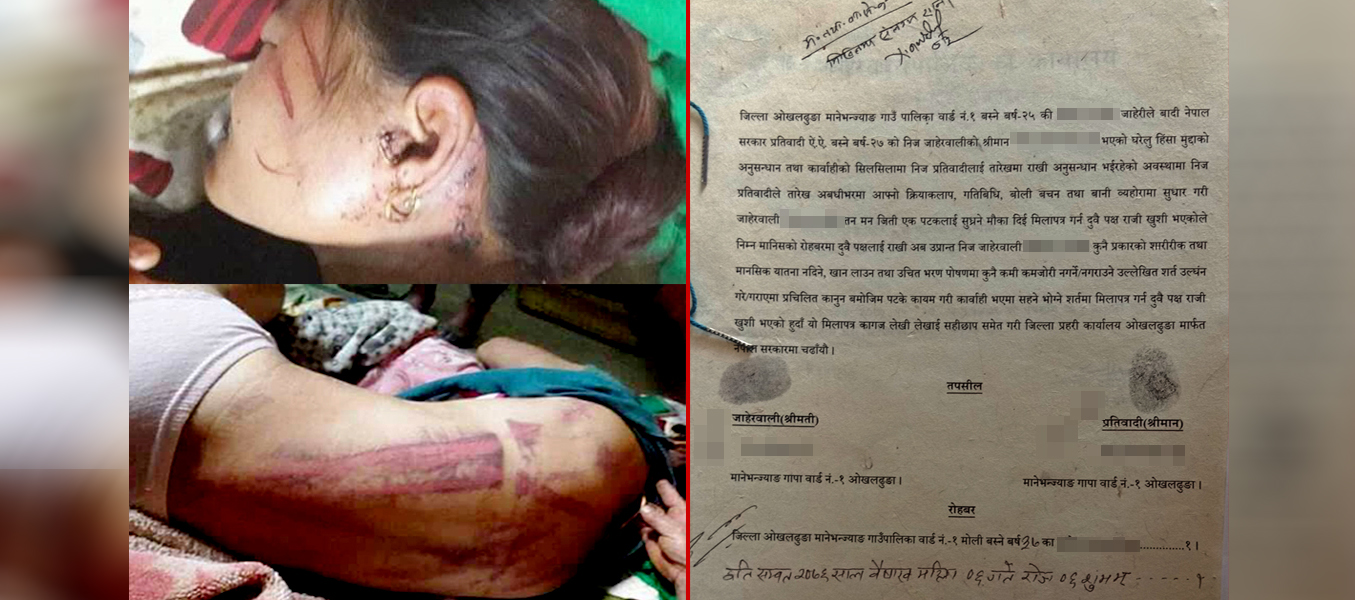
Despite brutal physical assaults from husband and family members, domestic violence survivors are compelled to reach a compromise with perpetrators due to poor economic status and family and social compulsions.
Four year ago, Sayapatri Sherpa, 32, of Okhaldhunga eloped with Dhupi Sherpa, a man five years younger to her from another village. The girl’s family approved of the marriage happily. Bride’s family had even offered groom gold and cash worth Rs 400,000 as dowry.
They enjoyed a happy married life together for a few years. They even had a child. But then Dhupi started drinking and abusing his wife. Her mother-in-law sided with her son and blamed her for everything. Sayapatri said that his family started abusing her when dowry money was over. Her mother-in-law even accused Sayapatri of tricking her son into marrying her.
As she had fought with her mother-in-law, the couple moved to Kathmandu to work as laborers. After spending some time in the city, her husband went to the Gulf for employment. Sayapatri returned to her home village.
But her relationship with her mother-in-law did not improve. Dhupi returned home after spending two years abroad. “Instead of resolving issues he only listened to his mother and started assaulting me. Initially, I remained silent thinking it was a family affair. But I was compelled to file a complaint at the police station as he tortured me beyond what I could tolerate,” she said.
The District Police Office, Okhaldhunga, pressured the couple to reconcile and sent them home. But he never changed his behavior. Dhupi behaved for about 10 days or so but started drinking and getting physically abusive again. “He used to make me do 100 sit-ups, then hung me upside down by the ceiling and beat me with a wood plank used to latch the door.”
She could barely walk, but dragged herself to the DPO and registered her complaint. After receiving a weeklong treatment at Rumjatar hospital, she stayed at a district headquarter based ‘safe house’ for some time.
Her elder sister has taken Sayapatri home. She says, “My sister has been through a horrible time, survived a mortal assault from her husband. We will have her divorce him now.”
Sayapatri has not yet fully recovered from physical assault. Her husband is absconding. Police summoned her mother-in-law and settled the case in a ‘compromise’ yet again.
***
In 2010, Salla Sherpa, 35, of Okhaldhunga married Gurans Shrestha, 27, of Solukhumbu. Salla had quit his job from Nepal Police service after an injury. But their love story was short-lived as the man became a drunkard; he started assaulting his wife.
She was denied food, daily expenses or clothes to wear. Gurans would not even talk to her for long. Frustrated by physical and mental tortures, she registered a complaint with the police in 2017.
The police even arrested and detained Salla. He was released the next day as he promised the police that would never drink and beat his wife. But he never kept his promise. Rather, he started beating her more frequently.
Dashrath Chaudhary, police constable and chief of Women and Children Cell in Okhaldhunga DPO, said Salla promised twice that he would behave, but he never stopped physically abusing his wife.
In fact, police used to coerce them to reconcile even after a third attempt to make a case against the abusive husband.
As soon as they would reach home from agreeing to reconcile in front of the police, Salla would start assaulting her. “Why did you lodge a complaint against me? Now onward, you shouldn't stay at my home. Go wherever you want,” she recalled him assaulting verbally shortly after they reached home.
When she could not bear anymore, Gurans left home, spent a few days at a local safe house and then moved to Kathmandu. An NGO in Kathmandu helped her. She got enrolled for Montessori school training and got a job at a private school.
Currently, she works for a non-profit organization working in violence management. This has helped her manage tuition fees for an 8-year-old son and household expenses. “It was his crime but I’m facing the punishment. I left home because of him, he is happily living at home,” said Gurans.
***
On 10 March, 2019, Pipal Rai brutally beat his wife Chameli Rai. Locals rescued unconscious Chameli and ferried her to Okhaldhunga Community Hospital, a two-hour drive from her home. She could talk about the incident only after a weeklong treatment at the hospital.
She filed a case of domestic violence at the DPO. Police took the accused into custody and inquired locals about causes of violence. Locals blamed alcohol as the reason behind the physical violence. Her husband had arrived home drunk that night. His wife was waiting for him to come to have dinner together. He arrived late and his wife objected to his behavior. No sooner the couple engaged in verbal war, the husband attacked his wife.
After Pipal promised not to beat his wife in the future at the police station, the officials asked the couple to forget the past and live together. The couple has been staying in Kathmandu with two daughters, ages eight and four.
Same story in Solu
Makhmali Rai, 33, runs a hotel in Khumbu Pasang Lhamo Village. She was in love with a man two years younger. And they got married four years ago.
Simal worked as a carpenter and his wife started running the hotel to raise their three-year old daughter.
“Initially, my husband did not like me talking to clients. He would suspect me of having affairs with them,” she said, “Then he started physically assaulting me just for talking with them.”
With a bruised body, Simal approached Salleri-based District Service Center for justice. The center helps victims of domestic violence. But the centre simply the center reconciled her with her abusive husband. They were asked to let it go and live together.
Even after counseling, Simal didn’t stop beating his wife. He used to argue over minor issues and beat her. She could not live with him. She went back to the center and then filed a complaint at DPO, Solukhumbu. Police summoned the couple just to sign an agreement for compromise and live.
Makhamali was expecting that her husband would change after the second arbitration. “But he started beating me from the moment we reached home. He would say ‘why did you file the case?” she said.
In November 2019, Simal tied her up and beat her brutally. She managed to escape from home at night and reached district headquarters. Then she filed a case against her husband; police reconciled them this time as well.
Three weeks after the third reconciliation, he attacked Makhmali with a khukuri. Nirmala Basnet, in charge at the District Service Center said, “Makhmali had sustained head injuries from the khukuri attack. She was bruised all over her. She told us that her husband tied her up with rope and thrashed her saying ‘call the police and let them hear’.”
Even as the couple married four years ago as per social tradition, their marriage has not been legally registered so far. Consequently, the child has been deprived of getting a birth certificate.
***
On 27 January 2019, Sunakhari Karki, 30, of Thulung Dudhkoshi Rural Municipality, Solukhumbu, filed a complaint against her husband Uttis Karki at DPO for marrying a second wife and abandoning her.
Deprived of education, Sunakhari works in her vegetable farm. On February 26, 2019, her husband promised her that he would take good care of her and never beat her up as he knew about a case filed against him in police office.
Two days after his promises, Udaya Narayan Basnet, chief of ward no. 2 of the rural municipalities organized an interaction programme in presence of local leaders as requested by Uttis. At the gathering, the husband agreed in writing to pay the due amount Rs 45,000 of the total 75,000 immediately, which he had borrowed from the wife and provide additional Rs 4,000 each month as school fee for their son and household expenses starting from mid-March 2019.
As per the agreement, Sunakhari withdrew both cases filed at the center and the DPO. But her husband didn’t respect the agreement. Instead, he started to abuse her.
Sunakhari, who had married a man four years younger than her, on August 28, 2019, has now filed a new case at the DPO.
***
Godawari Rai, 23, of Khumbu Pasang Lhamu Rural Municipality, fell in love with Sal Bahadur Rai of Khotang district and got married. Since there was no one in her father’s house, the couple stayed in Solukhumbu. With husband Godawari’s consent, who had recently finished her high school, they started a hotel business in Khumbu region. It started off well. Both of them used to work at hotels. They had a five-year-old son.
But Sal Bahadur didn’t like his wife talking with the clients. He would even doubt when she would talk with relatives over the phone. As disputes over the same issue worsened, Sal Bahadur started to physically assault her. But she never shared this with anyone. On 11 August 2019, she was brutally beaten up over her talking with a guest.
She reached district administration with a bruised and swollen body. With the support of the local women network, she lodged a complaint against her husband at the DPO. Police summoned the abuser at the office and coerced compromise-- warning him not to physically abuse her and change his habits.
But Sal Bahadur didn't really work on himself. “He turned more violent after the police case. I’m now living separately after he started to beat me day and night,” said Godawari.
Khotang’s case is worse
Gulab Shrestha, 45, of Diktel, faced continuous physical and mental violence by his husband Khayar KC. Initially, she tolerated everything and didn’t share it with anyone thinking it was a family affairs after all.
Khayar worked in Dubai for two years. The couple was leading an average rural life. But Khayar continued assaulting her both physically and verbally for no reason.
Unable to tolerate non-stop torture, she went to Diktel, the district headquarters, to file a case against her husband. With support from local women groups, she filed cases but it ended in a compromise like other cases settled in Okhaldhunga and Solukhumbu. Police called her husband to the police office, coerced a compromise and sent them home.
Khayer turned more violent. He would always find an excuse to abuse her verbally and then thrash her. She approached the police office once again but they ended the case in ‘compromise’.
Although the case was resolved in compromise thrice in the presence of police and women activists, Khayar never stopped beating her. She decided to separate from her husband, as there was no improvement in the relationship.
“I have been raising my daughter on my own. I don’t see the possibility of living together with my husband,” she said.
***
A year ago, Suryamukhi Rai, 20, of Kohtang filed a case against her husband, Angur Rai, 22, at the Khotang DPO claiming that he was not taking care of her. She was victimized by her family members, too after her husband ignored her.
Her father-in-law beat Suryamukhi as well. So, she went to the police office seeking justice. But the police summoned her husband and coerced them into compromise. The officer merely instructed her husband to behave well with his wife.
Following the police case, the intensity of violence against her increased further. Unable to tolerate anymore, she filed a second case against her husband. She decided to move away from home. She has completed her high school. “I can’t now stay together with this man anymoreI’m filing a divorce,” said Suryamukhi.
Another local from Khotang, Kamal Rai, 40, said that she was compelled to ditch her first husband and marry another man. She tried every possible way to keep her relation with Chiuri Rai.
“But everyday, he used to drink alcohol all day long and threaten me that he could do anything as he wishes. As torture and assault became intolerable, I went to Diktel DPO to lodge a complaint. Police settled our case in a compromise and sent us home,” said Kamal.
The intensity of violence increased after the police case. She filed several cases. But the police would always settle all cases in reconciliation. Then she started living with her parents. Later, she got married to another man. “I married my second husband to avoid domestic violence,” Kamal said.
Violence settled into compromise
These anecdotal evidence from Okhaldhunga, Solukhumbu and Khotang districts show that women are facing the worst forms of domestic violence. Many of such incidents don’t get reported. Even if they are reported, many are not registered at all, let alone legal recourse. Police prefer to settle cases in compromise and send them home.
Ninety-nine cases related to domestic violence were registered at the Okhaldhunga DPO in the past three years. Of them, 75 were settled in compromise; whereas 21 are still pending and only three were taken to the court.
Of the total domestic violence related cases registered at Okhaldhunga DPO in fiscal year 2017/18, 25 were settled in compromise, six are pending and only one case was forwarded to the court, police record shows.
Among 42 total cases at the police office in fiscal year 2018/19, 33 were settled in compromise, seven are still pending and one case was forwarded to the court.
Of the total 25 domestic cases registered till mid-February of the fiscal year 2019/20, 17 have already been settled in compromise, six are pending and only one case has been filed at the court, according to Milan Basnet, a police inspector at Okhaldhunga DPO.
In Solukhumbu, 82 domestic violence cases landed at the DPO. Most cases were settled into compromise, police record shows.
A total of 42 cases registered at Solukhumbu police office in the fiscal year 2017/18, 26 were settled into compromise and 16 are pending. Of the total 33 cases registered in the fiscal year 2018/19, 18 cases were settled in compromise. Interestingly, 15 plaintiffs are out of contact.
During seven months of the current fiscal year fiscal year 2019/20, seven such cases were registered whereas five of them have already been settled into compromise and two are under consideration, as plaintiffs didn’t appear before the police office since case registration.
Khotang recorded 67 domestic violence cases from fiscal year 2017/18 to mid-January of current fiscal year. Among those, 65 cases were settled in compromise in presence of police and only one case has been forwarded to the court while another plaintiff is out of contact.
All 28 domestic cases registered in fiscal year 2017/18 were settled in compromise. In 2018/19, only one case was forwarded to court. The police settled all remaining 18 cases in compromise.
Of the total 20 domestic violence cases registered in the first six months of the fiscal year 2019/20, 19 cases have already been settled in compromise. One victim is out of contact, according to Khotang police.
But law does not allow police to settle the case in compromise and free the accused in domestic violence cases. The Domestic Violence (Offence and Punishment) Act (2009) states, ‘a person who commits an act of domestic violence shall be punished with a fine of Rs 3,000 to Rs 25,000 or six months of imprisonment or both’.
As per the law, if a person who attempts to commit domestic violence or abets the crime or incites others to commit the crime should be liable to half the punishment of the perpetrator.
Similarly, if anyone who has been punished once for the offence of domestic violence should be liable to double the punishment upon every repetition of the offence. In case any individual holding a public position is found to be involved in domestic offenses, he or she should be liable to an additional 10 percent to the punishment.
Despite these harsh legal provisions, why are so many domestic violence cases being settled into compromise? Police Inspector Milan Basnet, who is also the spokesperson for Okhaldhunga DPO, argues that most victims are dependent on the perpetrator.
“We make perpetrators realize their mistake. Once perpetrators realize their mistake, then we convince them to compromise,” he said.
Mahedra Darnal, a spokesperson for Solukhumbu DPO, seconded Basnet’s argument. “Husband is the perpetrator, whereas wife is the victim. Wife and children are dependent on the husband's earnings. So we try to reconcile them since there could be problems in the family if the only person earning is sent to prison,” Darnal argues.
The then Khotang chief district officer Bamdev Gautam also thinks there is ‘no other way out than reaching a compromise’. “After summoning both perpetrator and victim, we offer them two options: either to go for compromise or legal process. Victims themselves request us to dismiss the case. And perpetrators also promise that they will improve. In the given condition, we settle the case in compromise through the women cell,” said Gautam.

 ‘It’s not a compromise’
‘It’s not a compromise’
When asked by Solukhumbu's Chief District Officer Rama Acharya why so many domestic violence are settled in compromises, she refused to comment over the issue. “Action will be taken as per law. I don’t want to comment further about this,” she said.
Ganesh Acharya, chief district officer of Okhaldhunga, argues socio-economic status of women compels them to compromise. “Women are responsible for raising children. Due to their love of the children and their own survival, they compromise with all odds. That’s why it’s not a compromise, it’s a forceful agreement.”
Bimala Rai, deputy mayor of Khotang Municipality, believes many domestic violence victims are forced to continue relationships after not having enough economic sources to survive. She blames our societal structures as well. “Our societal structure is so complex that wherever domestic violence victims go to society, police, judiciary or any other government bodies, they suggest compromise. None of them try to know about root causes of violence nor do they ever think about ensuring justice,” she said, stating that the police trained in traditional mindset pushes victims to go for compromise instead of ensuring justice.
Suman Rajbhandari, campus chief at Okhaldhunga Multiple Campus, echoes Rai’s statement. He states society itself forces women to go for compromise and they are forced to do so thinking about children, relatives and society even after the case is landed at the police office. “Ours is a patriarchal society. That’s why this compels women to compromise instead of justice,” said Rajbhandari.
*Names of victims and perpetrators have been changed to maintain privacy.
With support from the Center for Investigative Journalism Nepal (CIJ Nepal).
You May Like This
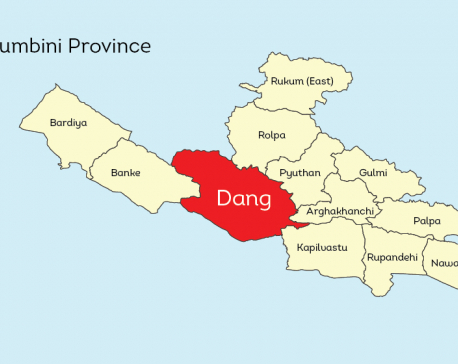
Lumbini Province reports 823 incidents of domestic violence in first quarter of the current fiscal year
BUTWAL, Dec 4: Eight hundred and twenty three incidents of domestic violence have taken place in Lumbini Province in the... Read More...

Stop saying, ‘it’s normal'
How normal is violence against women? One in every three women and girls experience physical or sexual violence in their... Read More...
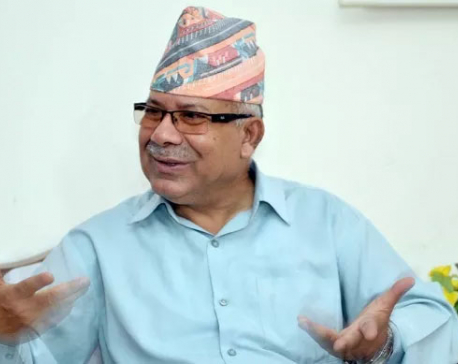
Party's name will be Nepal Communist Party after merger: Leader Nepal
KAILALI, Feb 9: CPN-UML leader Madhav Kumar Nepal said that the name of the new party after merger between CPN-UMLand... Read More...







Just In
- Seven houses destroyed in fire, property worth Rs 5.4 million gutted
- Police pistol missing after drug operation in Bara, investigation underway
- Truck carrying chemical used in drugs catches fire
- Nepali journalists Sedhai and Kharel awarded second prize at Fetisov Journalism Awards for their exposé on worker exploitation in Qatar World Cup
- Devotees gather at Balaju Park for traditional ritual shower at Baisdhara (Photo Feature)
- PPMO blacklists 33 construction companies
- UK Parliament approves Rwanda deportation bill, ending weeks of legislative stalemate
- SC refuses to issue interim order in petition against Sudurpaschim province govt




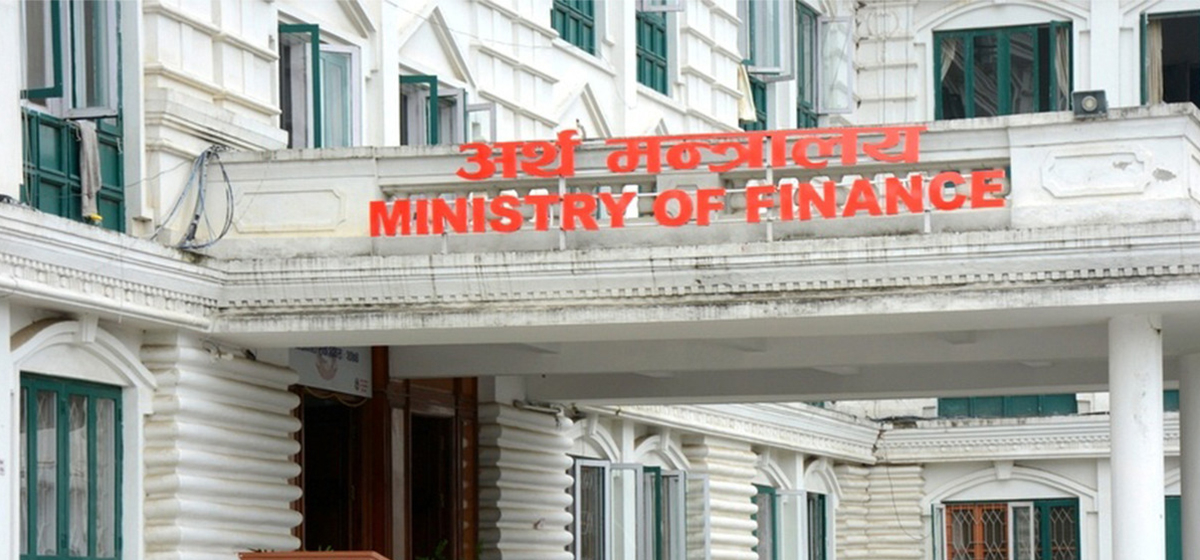



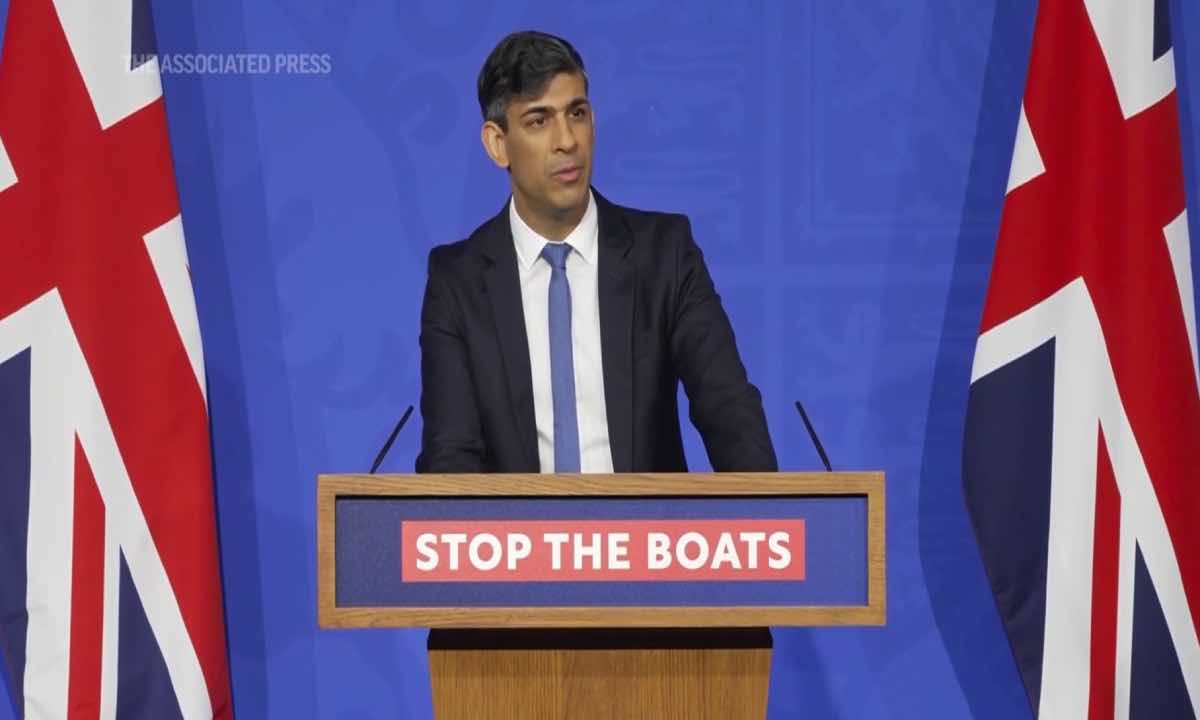


Leave A Comment